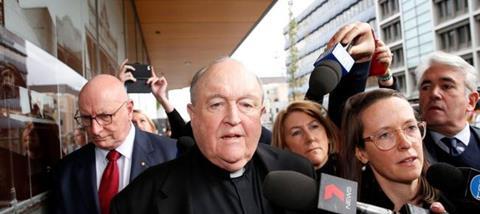
This week’s news that a Grand Jury in Pennsylvania has identified more than 300 abusive priests from the Diocese is shocking but sadly it is not surprising.
The Catholic Church in particular has operated a system of secrecy when it hears about allegations of abuse. Clergy and complainants are often sworn to secrecy and action is decided on in Rome. This has allowed cover ups and clergy avoiding detection by the police and prosecutors for decades. And worse, it has allowed abusers to continue to abuse, unfettered and unpunished.
There is in many large established churches a culture of cover-up. A culture that is far more concerned with maintaining the image and power of the clergy than preventing abuse or addressing the needs of the victims.
We at MACSAS (Ministry and Clergy Sexual Abuse Survivors) have continually observed governments and law enforcement agencies avoid tackling church organisations partly through a sense of deference and disbelief that clergy would commit sexual abuse of children but mainly because so many allegations are not routinely passed to the police by churches.
Our work has exposed the movement of accused priests secretly between parishes, dioceses or even countries, with the slate being wiped clean with each move and new congregations having no idea that their new priest poses a risk.
Unbelievably there is no legal duty to report the sexual abuse of children in England and Wales
Successive Popes could have required all reports of abuse to be turned over by Rome and Bishops to the police, yet despite pressure from survivor groups and even the United Nations Committee on the Rights of the Child they have failed to do so, instead favouring the protection of clergy and Bishops rather than children and the vulnerable.
Sadly, the Anglican church in the UK is no different. At the recent IICSA (Independent Inquiry into Child Sexual Abuse) inquiry hearings the Church of England has been found to have covered up, burnt and destroyed files, moved priests around and even helped one Bishop, Peter Ball, back into public ministry despite him admitting his sex crimes to police and the church knowing about many more victims.
IICSA also showed us in March how numerous abusers were protected by the Diocese of Chichester and evidence of abuse was consistently withheld from the police by successive bishops.
Eventually several priests were brought to justice but this was not due to any pro-active initiative from the church, it was due to the tenacity of the survivors who simply would not give up in their quest for truth and justice, often at enormous cost to themselves and their families.
Even more astounding is that no bishops in the UK have been held to account for their failures to report abuse or to protect children, not by the criminal justice system or even by the churches’ own disciplinary measures.
We are beginning to see state authorities attempting to address this issue in other territories such as Pennsylvania and in the recent prosecution of Archbishop Wilson in Australia but this simply cannot happen in this country.
The case for mandatory reporting
Unbelievably there is no legal duty to report the sexual abuse of children in England and Wales and withholding evidence and knowledge of abuse is not a crime either.
Throughout the IICSA hearings we have heard many times the call for ‘cultural change’ in the Roman Catholic and Anglican churches and it is clear that without it there is nothing to stop abuse continuing to go unreported and there will always be an inclination for bishops to protect their friends, colleagues and their institution.
If one looks at other areas of dramatic shifts in culture in the secular world it is clear that the main motivator for change is legislation, this has been clearly demonstrated with issues such as the requirement to wear seat-belts, the banning of smoking in public places and, most recently, the law preventing drivers from using their mobile phones while at the wheel.
It seems that only when people are required by law to do something (and there is a penalty if they fail to do so) that real change is achieved and that change becomes permanent and part of the culture.
We at MACSAS believe that there needs to be the introduction of law to require those who are responsible for other people’s children to report suspicions or allegations of abuse to the statutory authorities, outside of their institutions.
The churches and their bishops have been a law unto themselves for far too long. It’s time for change
This would mean that the veracity of allegations are assessed by the police or safeguarding professionals and not bishops and their employees, it would also mean that those who fail to report abuse or cover it up could be readily prosecuted.
We believe that such a law would better protect children by uncovering abuse much sooner, bringing abusers to justice and thus preventing further abuse.
We applaud law enforcement agencies in Pennsylvania and Australia for using the powers they have to seize documentation and to prosecute offenders and to go after those who have covered up for them but we fear that this will not happen here.
Failure to report abuse is not a crime, covering it up is not a crime and nobody can be held to account.
The churches and their bishops have been a law unto themselves for far too long. It’s time for change, it’s time for a change in the law, it’s time for Mandatory Reporting.
Children have suffered enough.
Phil Johnson and David Greenwood are members of MACSAS (Ministry and Clergy Sexual Abuse Survivors)
SPECIAL: Subscribe to Premier Christianity magazine for HALF PRICE (limited offer)




























